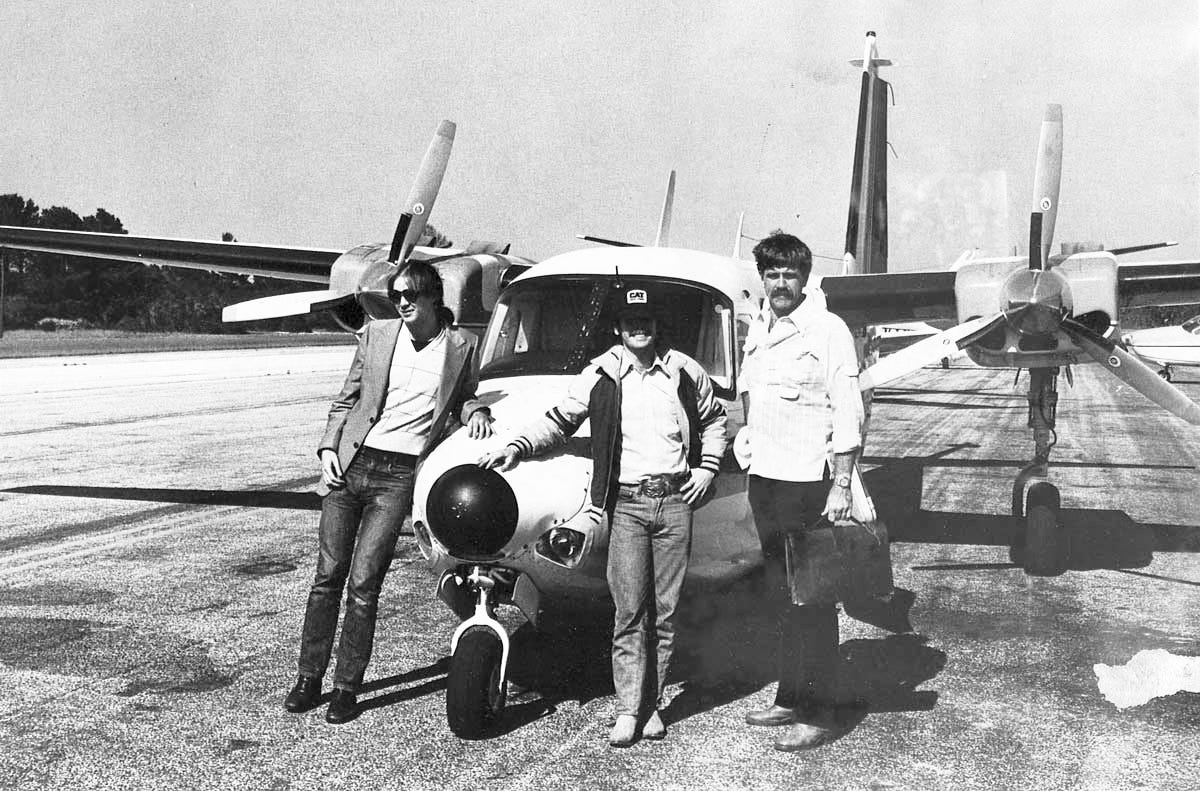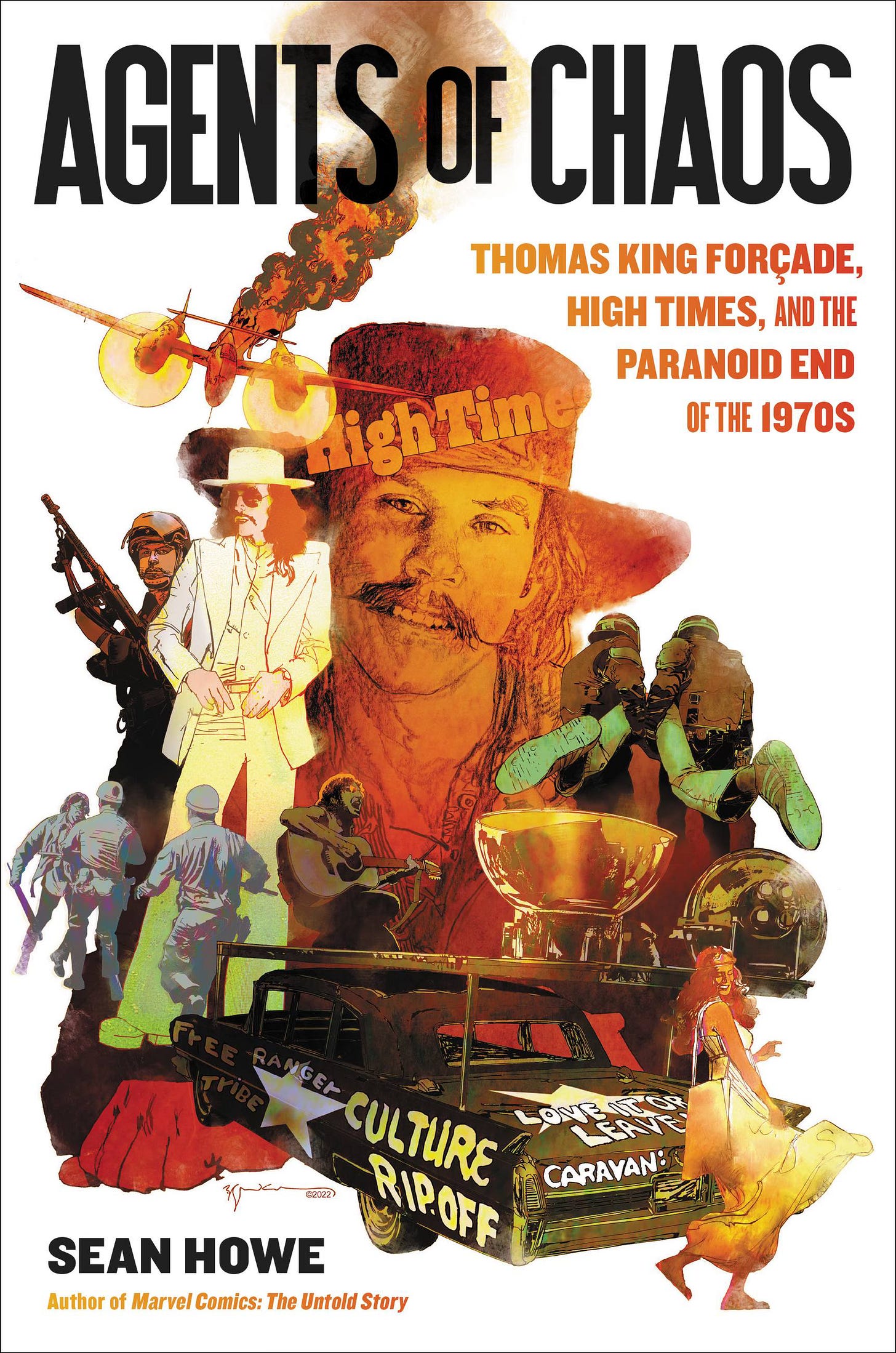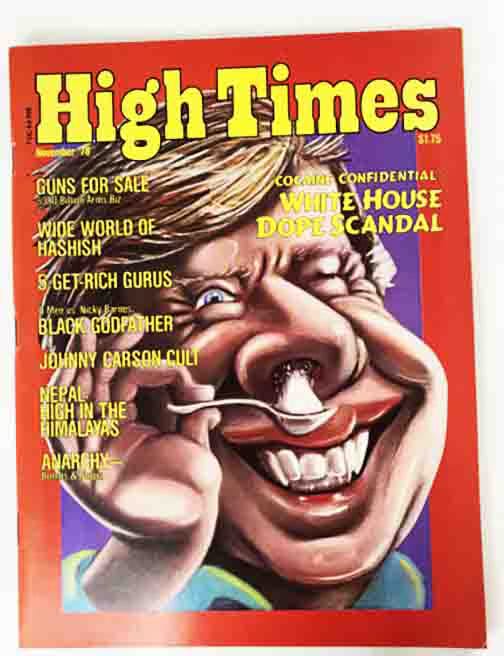
Narrator: In our last episode PUNK Magazine #14, with the Sex Pistols tour cover story, was sent to the printer and distributed nationally. Things were looking good!
In late April of 1978, High Times magazine founder Tom Forcade purchased a small aircraft (a 1946 Beechcraft D18) for future marijuana smuggling operations. A few weeks later in early May Tom’s best friend, Jack Combs was flying the plane, loaded with a very large shipment of high-grade marijuana from South America, to a drop-off point near Atlanta, Georgia. Forcade piloted a different small aircraft to guide Jack, staying as low as possible to avoid radar detection. The last time Forcade saw Jack’s plane it was above several pine trees.
“Get lower,” Tom ordered Jack.
He heard an explosion and saw a fireball: Jack’s plane hit the trees and crash landed. Tom flew his plane in circles above the crash site, desperately hoping Jack somehow survived the crash. All he could see was fire from the burning plane wreck.
It would be four days before the police located the wreckage. It took several days for them to identify bones as human remains.
Tom became despondent. He hired private investigators and attorneys to investigate whether Jack somehow survived and was in hiding. A theory evolved that the plane didn’t crash into the trees: the DEA or another intelligence agency planted a bomb in the plane that was triggered by the plane’s altitude.
As Tom’s personal secretary, Maureen McFadden recalled in Sean Howe’s book: “His paranoia went up several notches. Tom was really never the same after Jack’s death.” Sean Howe’s exhaustively-researched book (Agents of Chaos: Thomas King Forcade, High Times and the Paranoid End of the 1970s) recounts the entire horror story and its terrible aftermath.
High Times magazine and Jimmy Carter
“I support legislation amending Federal law to eliminate all Federal criminal penalties for the possession of up to one ounce of marijuana. This decriminalization is not legalization. It means only that the Federal penalty for possession would be reduced and a person would received a fine rather than a criminal penalty. Federal penalties for trafficking would remain in force and the states would remain free to adopt whatever laws they wish concerning the marijuana smoker.”
– Jimmy Carter, August 1977
Jimmy Carter was a long-shot candidate when he started running for president in 1975, when he stated he was in favor of the then-popular policy of decriminalizing marijuana. Since Carter Craig Copetas covered the campaign for High Times, which gave the magazine credibility as a national news source. The Allman Brothers held several benefit concerts that raised millions in campaign contributions, so they probably had an influence on Carter’s embrace of decriminalization.
Why Jimmy Carter Owes His Presidency to the Allman Brothers Band:
https://www.grunge.com/1208233/why-jimmy-carter-owes-his-presidency-to-the-allman-brothers-band/
This all changed when Peter Bourne (Carter’s Drug Czar) caused a huge scandal after he was accused of smoking pot and snorting cocaine at a December 1977 party hosted by the National Organization for Marijuana Reform (NORML). In July 1978, during a nationally-televised press conference shortly after the story broke, Jimmy Carter stated: “My preference is that marijuana not be grown nor smoked.”
A dozen states had decriminalized marijuana by 1978, but everything changed after this. Carter’s new drug czar, Lee Dogoloff (an anti-drug warrior who served during the Nixon administration) worked with anti-pot family groups and the War on Drugs was relaunched. Most people think Ronald Reagan was the president who started the Drug War (which isn’t over yet), but Richard Nixon started it— even though the blue ribbon committee he appointed to study the issue (the National Commission on Marihuana and Drug Abuse issued its report, Marijuana: A Signal of Misunderstanding, to Congress On March 22, 1972, strongly recommending decriminalization.
Even worse for High Times was how the marijuana paraphernalia industry was being targeted by family groups and anti-drug organizations. In March 1978, The New York Times reported that a group of preteenage children were able to purchase $300 worth of bongs, a pipe, a pen used for snorting cocaine and even some nitrous oxide. The shops didn’t bother with age limits. Politicians began writing legislation to ban the sale of all drug paraphernalia, and to ban High Times magazine. By October 1978 Carter was calling for a total ban of all drug paraphernalia, which included bongs, pipes, rolling papers as well as equipment used to grow or manufacture illegal drugs.
A Washington Post story about Carter’s paraphernalia ban quoted a panel of experts on drug policy:
“Most of the current popular thinking about marijuana was developed when it was generally far less potent than much marijuana sold today.”
Anti-drug warriors have said for decades. It should be compared with how 192 proof alcohol is much stronger than beer or wine, but too much alcohol can kill you while there are still no recorded deaths from cannabis use.
I remember sitting outside an office waiting to meet with an editor at High Times around this time and overheard a heated discussion between the top staff about the anti-paraphernalia movement. They were panicked! Most of the magazine’s advertising base was from paraphernalia companies, and the advertisements were quickly disappearing. Magazine sales were suffering. The government found a loophole in the First Amendment, while the ACLU and other publications lined up against High Times.
Tom Forcade’s master plan was to have High Times staff sell advertising and distribute PUNK through its new Alternative Communications Network. PUNK was the flagship publication, and they also distributed Trouser Press and Andy Warhol’s Interview. Now his staff was under siege, losing sales locations and advertisers.
This was just the beginning of the mountain of problems that we had to deal with that year into the next. PUNK magazine was finally getting distributed all over the USA with our biggest story and largest issue, but the national distributor, Larry Flynt, was shot in March, two months later Jack Combs died, and then the government started a campaign to shut down High Times. Tragically, the body count only went up after this.
Next Episode: PUNK Magazine shuts down
The best way to support this newsletter by purchasing a cool t-shirt!
But liking it and leaving a comment also helps.







I think it was a combination of things:
1. We were associates of Tom Forcade, who was a target of the government--if you read Sean Howe's book, you'll understand the situation a lot better.
2. The government had their hands full with the whole hippie/yippie/anti-war movement thing, so they would have wanted to stamp out a new youth culture ASAP.
3. The Allman Brothers and other rock musicians who contributed to his campaign probably wanted those "Yankee MFers" wiped off the map.
But that theory falls apart when you see evidence that politicians such as Jesse Jackson and Jimmy Carter calling for punk to be shut down. These were hardly low-level operatives. These are the top people in government.
Add to that the problem Carter was having with his Drug Czar getting involved in the cocaine scandal and everything else...
What I am attempting to do here is explain the "spiral of doom" that enveloped both PUNK and High Times from 1978-79. The amount of opposition to the magazine's mere existence is kind of unprecedented, I think. It's similar to the censorship of comic books in the 1950s and the suppression of underground newspapers in the 1960s and early 1970s.
'Twas ever thus.